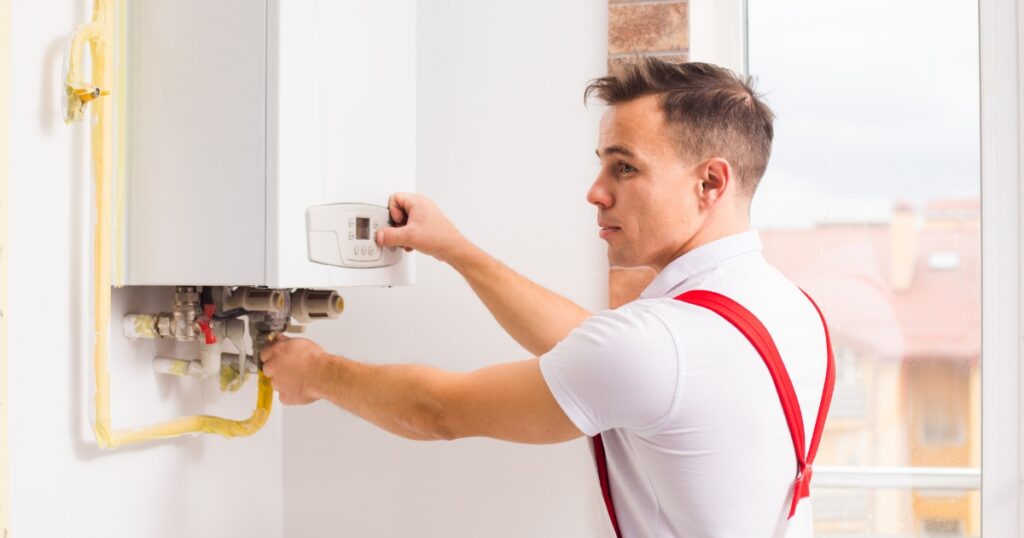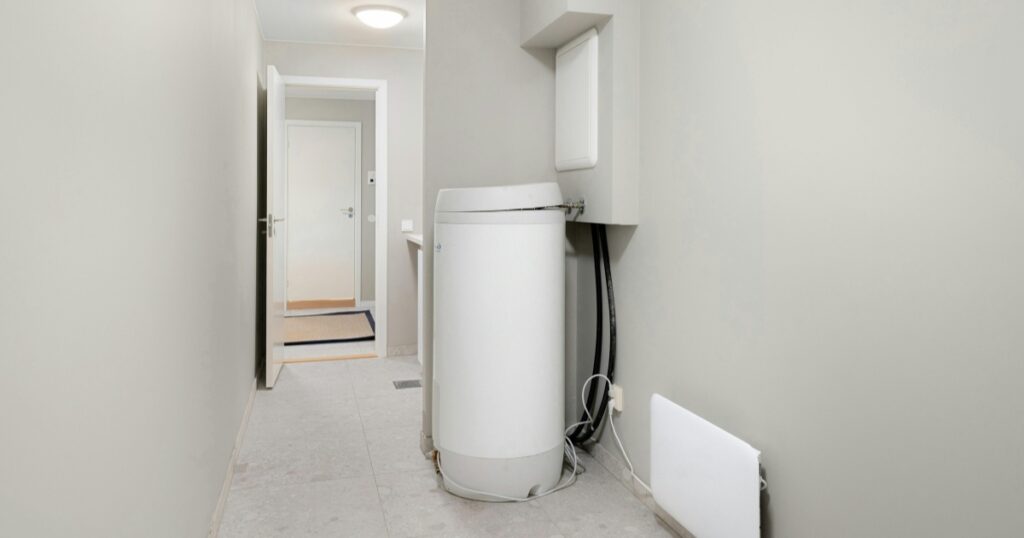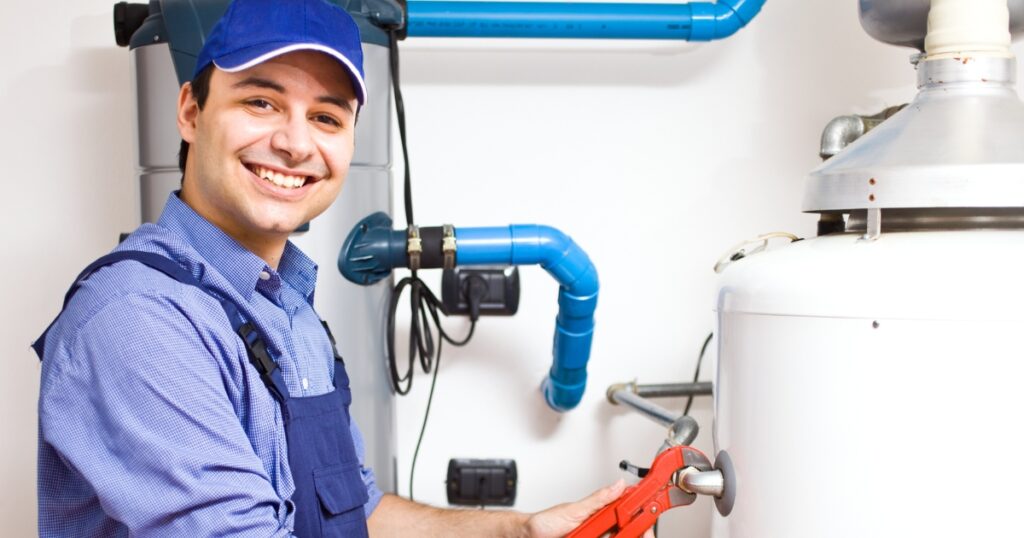Choosing the right hot water heater for your home can feel like a bit of a maze. We’re with you on that – diving into options and figuring out that about 25% of household energy use goes straight to heating up your bath and kitchen taps.
No worries though, our guide’s here to cut through the confusion and keep it simple. Read on for the lowdown.
Key Takeaways
- Different hot water systems suit different homes, including electrical systems for ease and convenience, heat pump systems for eco-friendly efficiency, and the choice between storage tanks or continuous flow depending on space and usage.
- Consider your household’s size and daily hot water use to pick a system that’s just right. Going for a heater with a high energy star rating can save you money on bills and help the planet too.
- Remember to look into rebates and incentives which could lower the cost of getting a new hot water system. Getting advice from plumbing professionals ensures you make smart choices about installation, safety, and ongoing maintenance.
- Sizing is key – knowing how much water your family uses helps avoid wasting energy or running out of hot water during peak times.
- It’s not just about picking any heater; factors like available space, whether your home’s electric or gas setup supports it, safety measures during installation, and potential savings from using renewable sources should guide your decision.

Understanding Different Types of Hot Water Systems
When it comes to hot water systems, various options are available such as electrical systems, heat pump systems, and storage tanks vs. continuous flow systems. Consider factors like household size and water usage when selecting the right system for your home.
Electrical systems
We often consider electrical systems as the go-to option for heating water in our homes. These systems use electricity to heat the water, making them a great choice for households connected to the electrical grid.
They come in various sizes and designs, allowing us to choose an efficient hot water heater that matches our specific household hot water requirements.
Electrical heaters can be installed inside or outside, providing flexibility for different home layouts. We appreciate their simplicity and the convenience of managing temperature settings precisely.
Also, opting for an energy-efficient electric hot water system helps us minimise our electricity bills while ensuring we always have access to hot water when needed.
Heat pump systems
Heat pump systems use electricity to move heat from one place to another instead of generating heat directly. They operate by transferring heat from the air or ground into a water tank, making them an energy-efficient option for heating water in your home.
Heat pump systems are ideal for households looking to reduce their carbon footprint and save on energy costs over time.
Considering the efficiency and environmental benefits, incorporating a heat pump system can significantly decrease your household’s energy consumption. This is essential in today’s ever-changing world where we seek more than just functionality from our appliances; we look for sustainable options that not only reduce our utility bills but also contribute towards a greener future.
Storage tanks vs. continuous flow systems
We all know the importance of having a reliable hot water system in our homes, so let’s explore the differences between storage tanks and continuous flow systems to see which might be the best fit for your household needs.
| Feature | Storage Tanks | Continuous Flow Systems |
|---|---|---|
| Capacity | Can store multiple litres of hot water, ready for use. | Higher initial investment can lead to savings on energy bills. |
| Energy Efficiency | Can lose heat over time, leading to potential energy wastage. | Generally more energy-efficient as it heats water only when needed. |
| Space Requirements | Requires more space for the tank, either indoors or outdoors. | Compact and can be installed on a wall, saving space. |
| Initial Cost | Often less expensive upfront but may cost more in the long run. | Higher initial investment but can lead to savings on energy bills. |
| Longevity | Typically lasts 10-15 years with proper maintenance. | Can last over 20 years with minimal maintenance. |
| Installation | Installation can be complex, depending on location and system size. | Less complex installation, but requires access to electricity or gas. |
| Suitability | Good for homes with high hot water demand at peak times. | Ideal for smaller households or where space is at a premium. |
Choosing between a storage tank and a continuous flow system largely depends on your household’s hot water usage, space availability, and budget. We hope this comparison helps you make an informed decision for your home.
Factors to Consider When Choosing the Right Hot Water System
When choosing the right hot water system, consider household size and water usage. Also, look for systems with high energy star ratings.

Household size and water usage
When it comes to choosing the right hot water system for your home, it’s important to consider your household size and water usage. Understanding how much hot water your family uses on a daily basis will help you determine the appropriate size and type of system that will meet your needs efficiently.
By considering factors such as the number of people in your home and their bathing habits, you can select a hot water heater that provides enough hot water without being too large or wasteful.
Analysing our household size and water usage is crucial in selecting an energy-efficient and cost-effective hot water system that suits our specific needs.
Determining the most suitable hot water heater for UK homes requires understanding our precise requirements based on household size and everyday usage. Selecting a correctly sized system ensures that we have enough hot water without unnecessary energy consumption or costs associated with oversized units.
Energy star ratings
When choosing a hot water system, it is essential to consider Energy Star ratings. These ratings indicate the efficiency of the appliance in terms of energy consumption. By selecting a hot water system with a high energy star rating, we can significantly reduce our electricity bills and minimise our environmental impact.
It’s important to look for systems that have been given favourable ratings as they offer optimal performance while consuming less power.
Now that we understand the significance of Energy Star ratings when choosing a hot water system, let’s delve into other factors to consider.
Rebates and incentives
After considering the Energy Star ratings for your hot water system, it’s crucial to explore potential rebates and incentives available. These can significantly offset the initial cost of purchasing and installing a new hot water heater, making it a worthwhile investment in the long run.
As homeowners, we should take advantage of any rebates or incentives offered by the government or local utility companies. These financial benefits can make upgrading to an energy-efficient hot water system more affordable while also contributing to a greener environment with reduced energy consumption.
Tips for Choosing the Right Hot Water System
When choosing the right hot water system, consider the size of your household and energy requirements to ensure an efficient solution that meets your specific needs. For more helpful tips on selecting the best hot water heater for your home, read our full article.
Sizing considerations
When choosing the right hot water system for our homes, considering the size is crucial. First, we need to assess our household’s hot water usage. This includes how many people live in the home and their typical daily routines.
Then, we should consider the number of bathrooms and appliances that use hot water. By evaluating these factors, we can determine the appropriate size for a hot water heater that meets our family’s needs without unnecessary waste or shortage.
Furthermore, it is important to look at the peak demand times for hot water in our household. Understanding when multiple showers or appliances may be running simultaneously helps us select a system with adequate capacity during high-demand periods.
Design and installation considerations
Now that we’ve addressed the sizing of your hot water system, it’s crucial to consider the design and installation aspects. First, think about where you’ll install the unit. Consider factors such as ventilation, clearance space, and access for maintenance.
It’s also important to check if your home can support the electrical or plumbing requirements of different systems. Moreover, hiring a licensed professional ensures proper installation and compliance with building codes while guaranteeing optimal performance.
When considering design options, ensure that your chosen spot allows easy access for repairs or replacements in the future. A well-thought-out location can save time and money down the line.
Also, when installing storage tank systems, remember that they require substantial space compared to continuous flow systems – factor this into your decision-making process.
Safety precautions
Before we dive into installing your hot water system, it is crucial to consider safety precautions. First and foremost, ensure that the installation is compliant with all relevant building codes and regulations.
This includes proper electrical connections, safe gas installations, and correct ventilation for gas-powered systems. Additionally, always consult a licensed professional for installation to guarantee safety and quality workmanship.
Lastly, be mindful of potential hazards such as scalding from hot water by setting the temperature at a safe level, and making sure there are no obstructions around the system.

Choosing the Best Hot Water System for Your Specific Needs
Select the ideal hot water system based on your specific requirements by considering electric, gas, solar, and heat pump options. Compare prominent brands and consult plumbing contractors for tailored hot water system services.
Considerations for electric, gas, solar, and heat pump systems
When selecting a hot water system, it is essential to consider the energy source that best suits your household. We can weigh the advantages of electric, gas, solar, and heat pump systems based on their efficiency and environmental impact.
Each option comes with unique benefits that can cater to different preferences and requirements such as cost-effectiveness, sustainable practices, or reliable performance.
We should also factor in aspects like available space for installation and the long-term financial implications of each type of system. Utilising rebates and incentives may also influence our decision-making process when choosing an energy-efficient solution tailored to our home’s specific heating needs.
Comparing notable brands
When comparing notable brands of hot water systems, we evaluate factors such as efficiency, reliability, and customer satisfaction. We consider brands like Rheem and Rinnai for their proven track record in providing energy-efficient solutions tailored to Australian conditions. By assessing the features, warranties, and after-sales support from leading brands, we ensure that your selected system meets your specific needs.
After analysing the comparisons between notable brands of hot water systems, we are ready to delve into utilising hot water system services from plumbing contractors.
Utilising hot water system services from plumbing contractors
When choosing the best hot water system for your home, we can benefit from utilising hot water system services from plumbing contractors. These professionals assist in the installation and maintenance of various types of systems, including electric, gas, solar, and heat pump systems.
Additionally, they can provide valuable advice on energy-efficient options and help determine the most cost-effective solution tailored to your specific needs and household size.
By partnering with plumbing contractors, we ensure that our hot water system is installed correctly and functions optimally. They also offer regular maintenance services to keep our system running efficiently over time.
Choose the Right Hot Water Heater for Your Home
Choosing the right hot water heater for your home involves understanding different types of systems, considering factors like household size and energy efficiency, and following tips for sizing and installation.
We also need to consider specific needs such as electric, gas, solar, or heat pump systems. Comparing brands and seeking professional services from plumbing contractors can help us make the best choice. Contact us and select the best hot water heater for your home.






